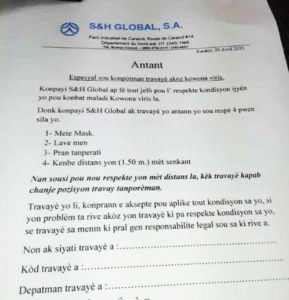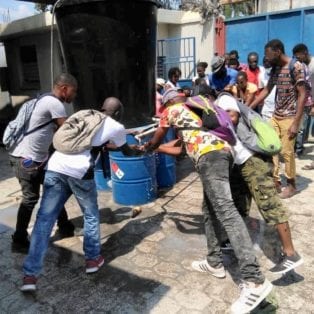As garment factories in Haiti begin reopening after shuttering for up to four weeks to prevent spread of the novel coronavirus, workers risk exposure during their crowded work commutes and at factories, while most have not received the wages they were promised during the factory closings, according to several garment worker unions there.
Meanwhile, workers say the price of some basic goods is skyrocketing, with reports of rice rising from 1,400 gourdes ($14.45) for one bag to as much as 2,200 gourdes ($22.70). Export apparel workers are paid a daily minimum wage of 420 gourdes ($5.07).

Although workers earlier this month traveled back to their closed factories to collect half their pay during the height of COVID-19’s spread in Haiti, risking their health in crowded tap-taps (public minibus transport) and at factories, many have not received their wages. And for those who were paid, they received only two weeks’ pay a month late, causing extreme hardship for the impoverished workers and their families. Last year, the Solidarity Center found that garment workers’ daily minimum wage is more than four times less than the estimated cost of living in Haiti.
Referring to employers and government officials, Reginald Lafontant, secretary general of the garment workers’ federation in Haiti, asked:
“How heartless are you, to be eating your fancy chicken, goat, turkey yesterday, Sunday? Meanwhile, factory workers have been home for 24 days without a cent. It has been 24 days since they’ve been told to stay home and they haven’t gotten a cent.
“Workers don’t have a cent to buy even herring or even cod fish to boil for their wives, their husbands, their children,” said Lafontant, who heads the Groupement Syndicat des Travailleurs Textil pour la Reimportacion d’assemblage (GOSTTRA).
Limited Factory Work, Unsafe Conditions

Workers and their unions also report that S&H Global at the giant Caracol Industrial Park is requiring workers to sign a document (left) stating that they will take precautionary measures while at work, including wearing face masks and taking their temperatures—and agreeing that if they get sick, they are legally responsible for their illness.
Yet when workers returned to the factory, they were not allowed in, forcing them to gather in front of the gate in crowded conditions, according to the garment unions.
Factories now must operate at 30 percent capacity, with most workers scheduled for three days, forcing them to live on at least half of their usual salary, which was already one-quarter of the living wage.
In addition, since March 29, more than 11,000 Haitians have returned to Haiti from the Dominican Republic. While some are fleeing the rapid increase in COVID-19 cases in that country, others are being expelled by Dominican authorities. Among those are day laborers who work in the Dominican Republic and return to Haiti each day.
On March 26, four national-level unions with members in the garment sector submitted a joint proposal to President Jovenel Moïse calling on the government and employers to respect International Labor Organization (ILO) protocols on COVID-19 in the world of work. The coalition also called on the government and employers to pay workers affected by factory closures the equivalent of the daily wages they earned on average in the three months prior to factory closures.
The unions, all Solidarity Center partners, are Centrale Nationale des Ouvriers Haïtiens (CNOHA), Confederation des Travailleurs Haïtiens (CTH), Confédération des Travailleurs- euses des Secteurs Public et Privé (CTSP) and ESPM-Batay Ouvriye.

